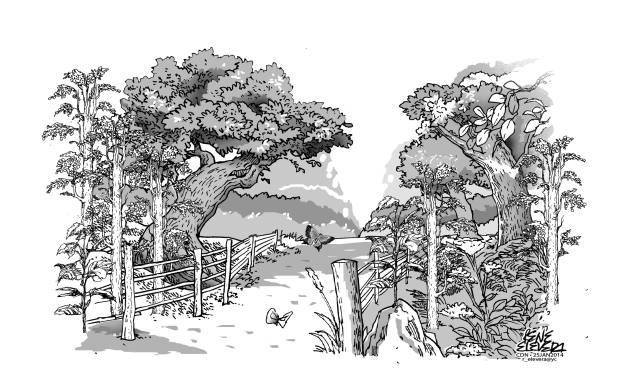
Nonetheless, I find the sight of green growth refreshing, and instinctively, every time we pass by towards the gate, check on the progress of the now flowering maize.
But this morning, a man sitting against the trunk of a malunggay tree in the midst of the corn caught my attention. He did not seem a resident of the village and I suspected that he had entered through an unsecured gap in the village wall. I thought of alerting our help to his presence but changed my mind. The man appeared old and shabby, and just sat in the shade of the malunggay tree. He had beside him two bottles filled halfway with water and juice. Did he come just to rest, to slack off, with a little help from his drinks, and the silence and morning, which he shared with the shrubs and trees?
And so it came to pass that in my neighbor’s garden, among the maize and beans, a man had sought solitude in order to find that which the streets had robbed him of — peace.
But the streets could not keep what it has taken away. Just days ago, in the hours towards midnight, we found ourselves travelling through a thoroughfare full of young people partying. A young man with colorful tattoos crisscrossing his arms all but forced us to quaff of the beer that he thrust towards us, and when we refused pounded on our car. We could see on the side many more of his kind, male and female, tippling and shouting and kissing. We travelled on. A half-naked man with a bottle parodied a shepherd dog by dancing before the car for part of the way. When at last we put a safe distance between them and ourselves, we heaved a deep sigh of relief.
To find peace and wholeness, the old man came to the right place, the neighbor’s garden. A cornfield or a wood offers the same refuge — or a fishing village.
Such as that on a small island linked to my hometown by a narrow wooden bridge, on which the fishermen reside. When the wife and I visited it, the silence overwhelmed us. We saw the usual domestic activities, the wives breast-feeding; the children playing tag; the men tinkering with their nets and boats. Whatever noise accompanied all this only deepened the peace — the movements of the folk as they went about their duties simply served to deepen their thoughts, which not even the soap on the radio managed to disturb.
I realized that silence had so embedded itself into the fishermen as to win against talk in its dominance of the hours. The hours of solitude on a desolate sea, of waiting, of biding one’s time, had seeped into their being.
In his Gospel, Matthew writes about four fishermen — Simon and his brother, Andrew, and John and his brother, James — whom Jesus surprised at work and asked to come with him and he would make them fishers of men. Matthew adds that “they left their nets at once and followed him.”
At once? No, not at once. In the silence, during their months and years of solitude while fishing at the Sea of Galilee, they must have heard within them a voice, and the voice must have stayed with them, and they must have sought its source, and recognized it when Jesus said, “Follow me.”